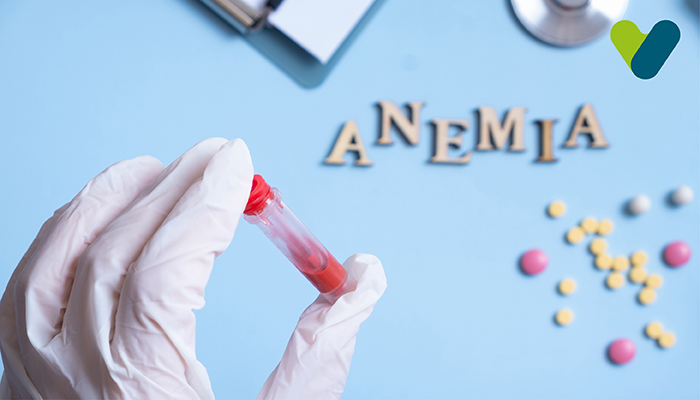Ravi has been feeling very weak and fatigued for the last few days. He visits his doctor, who asks Ravi about his medical and family history and performs a physical exam. He then prescribes a Complete Blood Count (CBC) test for Ravi.
The results of the CBC come back and Ravi is informed by his doctor that he has Anemia. Ravi wants to know more about this condition and its possible treatments. He researches about anemia and its treatment and finds the following information:
What is Anemia?
Anemia is a condition where the number of red blood cells in the blood decreases. The protein in red blood cells is hemoglobin. Hemoglobin carries oxygen and delivers it through the whole body. In anemia, the hemoglobin level also decreases. If hemoglobin is low enough, the tissues or organs may not get enough oxygen.Around one-third of the world’s population has a form of anemia. Symptoms of Anemia include weakness, fatigue, shortness of breath, paleness of skin. There are over 400 types of anemia. Anemia develops due to other health issues that interfere with the RBC production of the body or increase the rates of breakdown or loss of these cells. The most common causes of Anemia are blood loss, decreased or impaired RBCs, and destruction of RBCs.
Certain types of anemia are hereditary and are passed through genes. Iron- deficiency risk in women is high because of loss of blood from menstruation and higher demands of blood supply in pregnancy. Older adults often suffer from anemia because of their likelihood of having kidney disease and other chronic conditions. A doctor can diagnose anemia through a CBC blood test. The treatments vary but they may involve blood transfusion, iron and vitamin supplements, and bone marrow transplants.
Treatment of Anemia
There are many different types of anemia. The cause of Anemia determines its treatment.- Iron deficiency anemia: A common type of anemia in which the blood lacks healthy red blood cells. Without enough iron, hemoglobin in red blood cells is not sufficiently produced which leads to oxygen shortage. Treatment for this kind of anemia involves taking iron supplements and making dietary changes that can help. For some people, the treatment involves receiving iron through a vein. If blood loss- other than menstruation- is the cause of the iron deficiency, the source of bleeding has to be located and stopped.
- Vitamin deficiency anemia: A lack of healthy red blood cells caused because of lower amounts of vitamins like folate, vitamin B-12, and vitamin C. Treatment involves dietary supplements and increasing nutrients in the diet in case of folic acid and vitamin C deficiency. Vitamin B-12 shots might be required if the patient's digestive system has trouble absorbing vitamin B-12 from his or her diet.
- Anemia of chronic disease: Anemia of chronic disease is having low levels of RBCs because of autoimmune diseases or other chronic diseases. No particular treatment is available for this kind of anemia. The doctor will focus on resolving the underlying condition. In severe circumstances, a blood transfusion or an injection of a synthetic hormone, Erythropoietin (EPO) that might help in stimulating the production of red blood cells might be administered. Erythropoietin is produced in the kidney and makes red blood cells.
- Aplastic anemia: The Body stops producing enough new blood cells in aplastic anemia. Blood transfusions and bone marrow transplants are the modes of treatment for aplastic anemia. Blood transfusions provide red blood cells and bone marrow transplants replace the patient’s bone marrow with healthy cells.
- Anemias associated with bone marrow disease: Diseases of bone marrow are common causes of anemia and can put you at blood cancer risk. Treatments include chemotherapy, medication, or bone marrow transplant.
- Hemolytic anemias: This anemia occurs when the bone marrow isn’t creating enough new red blood cells to replace the ones that are being destroyed. Hemolytic anemias are treated with immunosuppressant drugs, avoiding suspect medications and treating infections. Immunosuppressant drugs suppress the immune system which may be attacking the patient’s red blood cells. Ongoing treatment is generally needed in case of severe hemolytic anemia.
- Sickle cell anemia: An inherited red blood cell disorder where there aren’t adequate healthy red blood cells to carry oxygen throughout the body. Treatment for sickle cell anemia includes oxygen therapy, pain relievers, and intravenous fluids. Blood transfusions, antibiotics, and folic acid supplements might also be recommended. Hydroxyurea, a cancer drug, is also used to treat sickle cell anemia. A medication called voxelator(Oxbryta) can help red blood cells keep their proper shape. Crizanlizumab-tmca (Adakveo) helps blood cells from sticking together and blocking vessels. The medication is called voxelator (Oxbryta) which can help your red blood cells keep their proper shape. L-glutamine oral powder (Endari) can help in pain and also guard against acute chest syndrome.
- Thalassemia: Thalassemia is an inherited disorder where hemoglobin is less than normal in the body. Managing thalassemia involves folic iron supplements, medication, blood transfusions, blood and bone marrow stem cell transplant, or removal of the spleen.No treatments are required for most mild forms of thalassemia.
Conclusion
Anemia is a common blood disorder that can occur in people of all ages, sexes, and ethnicities.The treatment for anemia depends on the cause. Some people can manage anemia by making dietary changes alone while others may require surgery and extensive medical treatments. Eating food rich in iron like pulses, beans, brown rice, fish, nuts and seeds, etc. is recommended. If you feel weak and tired, seeing your doctor for testing is recommended.


